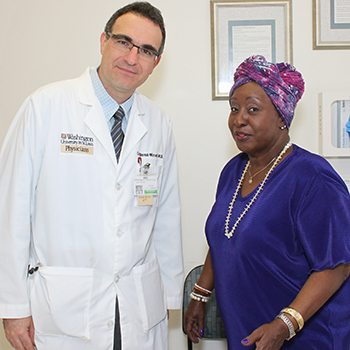Researchers at Washington University School of Medicine in St. Louis are evaluating whether vitamin D can slow the development of cardiovascular problems in African Americans with diabetes. They are more likely to die from cardiovascular disease than Caucasians with diabetes.
The researchers are seeking to enroll about 90 African Americans who are 45 to 80 years old and have type 2 diabetes. Study volunteers must not have heart disease or have suffered a stroke.
“Cardiovascular disease is a major health problem and cause of mortality in African Americans,” said Carlos Bernal-Mizrachi, MD, the study’s principal investigator. “Compared to Caucasians, African Americans suffer disproportionately from type 2 diabetes and heart disease.”
Nationally, African Americans with diabetes are 36 percent more likely than Caucasians with diabetes to die of cardiovascular disease. In past studies, Bernal-Mizrachi has found that low levels of vitamin D can double the risk of cardiovascular disease in patients with type 2 diabetes. His research also shows that blood vessels near the heart are less likely to clog in people who get adequate levels of the key vitamin.
Study volunteers will be screened at the School of Medicine to determine their vitamin D status. Those with low vitamin D levels will be asked to return for a second assessment, during which investigators will evaluate participants’ risk for coronary heart disease by measuring electrolyte levels, kidney function, blood cell counts, average blood sugar levels and cholesterol levels.
“In general, vitamin D deficiency is more common among African Americans, and that may help explain why they are so much more likely than Caucasians to have severe cardiovascular complications related to diabetes,” said Bernal-Mizrachi, associate professor of medicine and of cell biology and physiology.

Volunteers who meet the study’s criteria will be randomly assigned to one of two groups. Those in the first group will take 600 international units of vitamin D daily to try to raise their levels of the vitamin to the standard recommended for good health. Participants in the second study group will take 4,000 international units of the vitamin daily.
Subjects will be evaluated about every two months to measure blood sugar levels, hypertension, heart function and various markers of inflammation — all risk factors for heart disease.
“Compared to other potential interventions, vitamin D is very inexpensive and doesn’t have many known side effects,” said Bernal-Mizrachi. “We believe vitamin D could have a very big impact if the study shows that it can prevent or delay heart problems in African Americans with diabetes.”
For more information or to volunteer, call study coordinator Robin Bruchas at 314-362-0934 or email vitaminDstudy@dom.wustl.edu.
Washington University School of Medicine’s 2,100 employed and volunteer faculty physicians also are the medical staff of Barnes-Jewish and St. Louis Children’s hospitals. The School of Medicine is one of the leading medical research, teaching and patient-care institutions in the nation, currently ranked sixth in the nation by U.S. News & World Report. Through its affiliations with Barnes-Jewish and St. Louis Children’s hospitals, the School of Medicine is linked to BJC HealthCare.